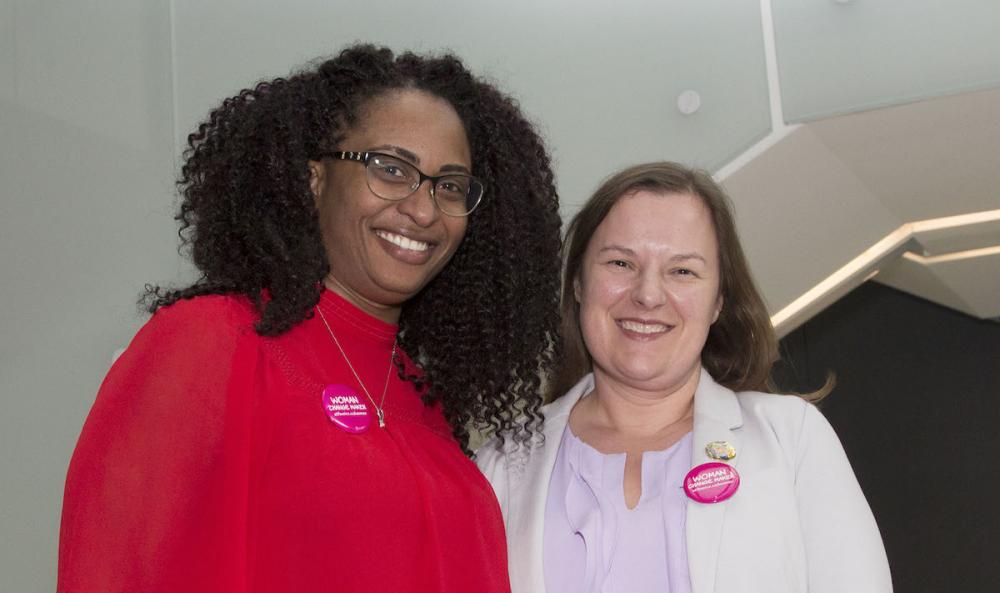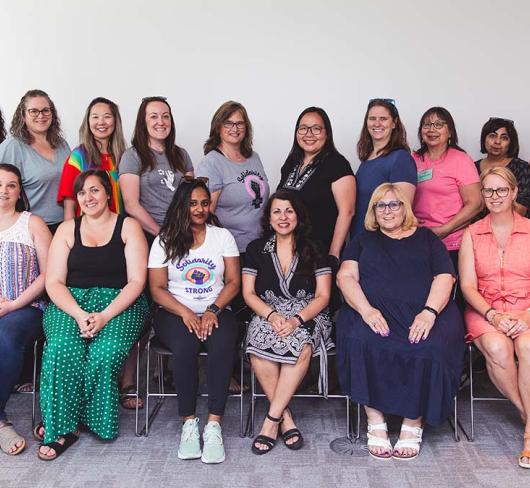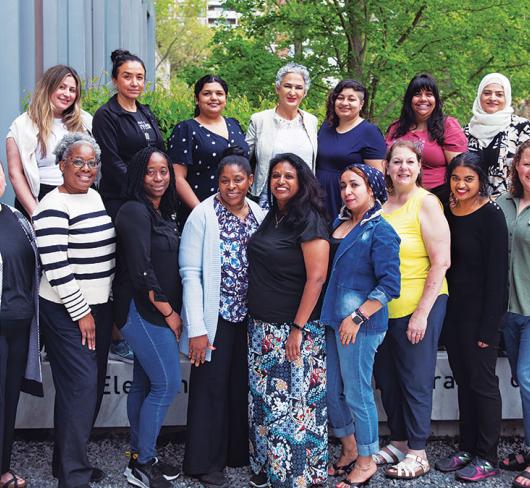
Reflecting on the Importance of Mentorship
IZIDA ZORDE: The two of you are at the end of ETFO’s two year mentor-coaching institute for women. I’m wondering if we can start by talking a little about how you define mentorship? How do you become a mentor and how do you find one?
APRIL ELLIOTT: Mentorship is support. It’s believing in someone, helping them believe in themselves, and putting paths to leadership in place alongside someone’s goals. It’s cushioning the falls that occur on the journey, it’s treading beside someone so they can lean on you, and it’s celebrating the learning and victories along the way. It’s holding up the mirror to someone so that they learn to see what they sometimes can’t – that they’re ready, that they’re leaders and that they can do it.
KEDISHA ALLEN: The simple answer to finding a mentor is to ask. The women who hold leadership roles in ETFO are incredibly willing to offer support. If you know a woman with similar passions, seek her out, make a phone call, send an email or attend a conference or workshop where you know she will be. The absolute worst thing she can say is no, but that has never been my experience.
IZIDA: Can you tell me about ETFO’s Mentor Coaching Women’s Program and why you both decided to get involved?
APRIL: I was so excited to hear about this ground-breaking program several years ago and jumped at the chance to be a mentor. I’ve been so fortunate to have incredible mentors (in the program, we call ourselves and those who came before us “femtors”) in my life thus far and it felt like an amazing opportunity to become a mentor to other women who were seeking leadership.
KEDISHA: This two-year program was the first of its kind for ETFO. The women mentors walked where we as mentees were about to take our first steps. They were keenly aware of the glass ceiling and the barriers that are in place to slow the movement of women in leadership. Their experiences were invaluable, and I could not pass that up. When I heard about the program, I wanted to be among the first mentees tutored by strong, forward-thinking women.
IZIDA: Why is mentorship important? Why is it particularly important to ETFO as an organization committed to equity?
APRIL: When I first began thinking of myself as a leader within ETFO, I asked myself what my goals and beliefs about leadership were. The first one, the one that really is the foundation upon which I stand, is that I want to develop the leadership potential of other women. So, that’s the framework through which I see most of my involvement with ETFO. Mentorship so closely aligns with my goal that its importance can’t be understated.
Both formally and informally, through the program and through networks around the province, mentorship is important because it shows women they can do it, their goals, whatever they may be, are attainable, and they don’t have to do it alone. It reminds them there’s a huge support network behind them. I also think it’s important because one of the responsibilities of leadership is to bring other women up along with you. Mentorship provides for that.
IZIDA: Kedisha, what has changed for you since becoming a mentee?
KEDISHA: Everything. In the last two years, I have run for and won a seat on my local executive. I organized a new committee in the ETFO Durham Local, The Black Educators and Allies Committee, which hosted its very first annual dinner and dance to recognize the International Day for the Elimination of Racism. I participated in Working Towards Equity: The Power of ETFO’s Women’s Programs video, facilitated a workshop for ETFO’s Visions program and contributed to our very own Voice magazine. Who knows, maybe one day you will see my name on the ballot for a position on the provincial executive. What is interesting about this journey is that it was never my aspiration when I came to teaching. I wanted a classroom and 30 years of teaching. My journey started with an accusation that brought me to the union for support. Since then, I have never let go. So, what has changed? My mindset. I can, with support from a mentor and strong allies, take on any goal, task or challenge and conquer it.
IZIDA: Can you tell me the story of your relationship, of being assigned to one another?
APRIL: If you were to first look at Kedisha and me, you might think we were a terrible match. We’re from two very different locals, our personalities seem like total opposites, our experiences within ETFO have been really different, she’s black and I’m white. But then we got to know each other and we found out that we had a lot more in common than we thought. Our goals for leadership are very similar and at the end of the day we both believe in lifting up other women.
The afternoon we were paired up, the mentors were brimming with enthusiasm and absolutely excited to be paired with mentees and get to work. We were all a little nervous, but we were sure that it was going to be an amazing experience. The mentors stood in a line and our mentees’ names were called out. Many embraced when their pairings were revealed, some smiled and shook hands, but everyone looked happy to be paired. Then, our pairing was announced. I smiled, did a little clap, leapt towards Kedisha…and she made it clear, with arms crossed, that I needed to tone down my exuberance.
KEDISHA: Our relationship did not have the best start. As far as I was concerned, somebody had made a mistake. One by one, each pairing was announced and partnerships began. I remember holding my breath and hoping I would get the mentor I wanted…who was not April. When we were paired, I was not impressed and I think it is safe to say, most people in that room could tell. As April pointed out, she is a white woman from Kingston. How could she help me navigate the environments and challenges I encounter as a black woman in the classroom? I could not see this relationship working. After two years of learning and growing together, I am glad it was her! She challenged and continues to challenge my thinking, and insists that I dig deeper and reach higher. Our relationship has been unquestionably real. I was open and honest about the things I felt she could not provide for me as a mentor. Coincidently, these are the very moments that I learned the most about myself. Today, I can say without hesitation, that Ms. April Elliott is a friend and will continue to be a trusted mentor long beyond this program.
IZIDA: Kedisha, you mentioned the importance of mentorship specifically for racialized women. Can you talk about that a bit?
KEDISHA: It boils down to a very simple concept. If children in the classroom do not see teachers who look like them, why would they aspire to be a teacher? Similarly, if racialized women do not see themselves reflected in the leadership, why aspire to the position? Racialized women need to see themselves represented in the leadership, but that can only happen if they are mentored. Consequently, many of those mentor relationships will look like the one that April and I had. The question then is, will these relationships work? Moreover, will that mentor be willing to step aside to create a space for her mentee? We are a union that prides itself on equity and inclusivity and yet we fall short in this area. There is a significant gap between the numbers of men compared to women in leadership positions. That gap widens when we look through the lens of racialized women. I think it is important to create a space for racialized women to be mentored. With that said, I hope members do not see these as token spaces or programs, but authentic opportunities to encourage greater participation of racialized women in the leadership of this union.
IZIDA: On reflection, now that the formal part of mentor coaching is coming to an end, what have you both learned? What does your relationship mean to you and what will you do with your new skills and solidarities moving forward?
APRIL: I have learned that the Mentor Coaching Program works. When you look at the original group of women (both mentors and mentees) who were part of this two-year pilot program, it is astounding what we have accomplished. Women have moved into amazing leadership positions, both within their locals and provincially. The empowerment they have achieved is visible in their involvement in annual meeting, examining local and provincial constitutions, and in speaking at the mic when opportunities present themselves. And that is very, very exciting. I’ve learned that mentorship works.
Our relationship means solidarity and sisterhood, support and empowerment. Kedisha and I will remain friends as she uses her new skills to pursue even more leadership opportunities and supports members throughout the province. I will always be a huge fan of hers and will continue to support and mentor her in any capacity that she finds useful. Kedisha’s journey of leadership is just beginning and I am so excited to see what she chooses to do next; whatever that is, I will be behind her.
IZIDA: What advice do you have for other women who are looking at getting on this journey?
APRIL: Just do it. If you’re wondering if you want to apply to the mentee program, do it. You have nothing to lose and everything to gain. If you’re wondering if you’re ready to be a mentor, I imagine you’re already doing some informal mentoring. Listen to yourself; listen to that little voice inside you that’s whispering, “Yes, I can.”
KEDISHA: Jump in. If you think about it, you will find a million reasons why you cannot. There’s one quote by Marianne Williamson that has guided my thoughts for as long as I can remember. “Our deepest fear is not that we are inadequate. Our deepest fear is that we are powerful beyond measure. It is our light, not our darkness that most frightens us. We ask ourselves, who am I to be brilliant, gorgeous, talented, and fabulous? Actually, who are you not to be?... as we let our own light shine, we unconsciously give other people permission to do the same. As we are liberated from our own fear, our presence automatically liberates others.”
To the woman who is looking at getting on this journey, I say to you, who are you not to?
Kedisha Allen is a member of the Durham Teacher Local. April Elliott is a member of the Limestone Teacher Local. They participated in the ETFO Mentor Coaching Women’s Program.
Izida Zorde is an executive staff member at ETFO.

